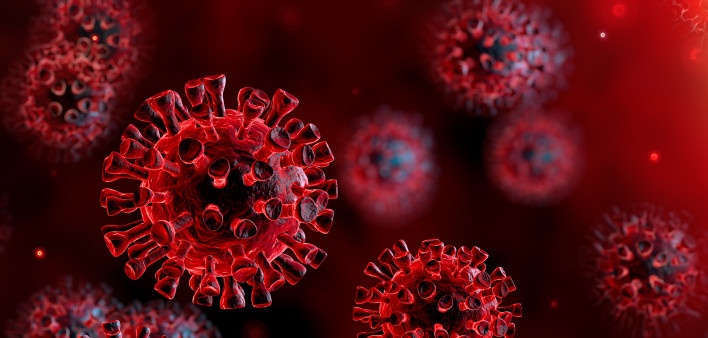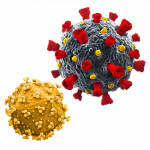COVID-19 is the second pandemic that I’ve lived through and I’m only 58 years old. Ever since I was diagnosed with HIV in 1982, I’ve been an HIV activist. When COVID-19 emerged last year, like so many others, my advocacy switched gears and all the energy I had spent decades devoting to HIV was poured into raising awareness about this new virus and how to stop it.
It hasn’t been easy. When we went into global lockdown, it brought me back to the early days of HIV when everything was unknown. Back before it even had the name HIV. Back to the days when our friends were dying in unfathomable numbers. It’s hard to even describe how re-traumatized so many of us HIV long-term survivors have been during this time, as we were reminded of the profound loss we experienced not so long ago.
Being able to contribute has made a huge difference for me. As an HIV-treatment activist, I learned how to interpret complex scientific data and translate it into language that could be understood by people for whom science isn’t a second language. As the chair of the AIDS Clinical Trial Group (ACTG)’s Global Community Advisory Board (GCAB), I help lead efforts to support community outreach, education, and participation in clinical research and represent community concerns in the ACTG. From that work and my other advocacy efforts, I know how to collect the diverse perspectives of the HIV community on a broad range of topics and share with clinical trial teams. My many years of HIV advocacy work allowed me to hit the ground running when COVID-19 appeared and apply these skills to a disease so full of unknowns.
We have learned so much from those difficult early days of HIV, and those lessons let us skip ahead a little with COVID-19. We knew how vital communication was when it came to complex science and medicine, and how careful we would need to be with public health messaging. We also knew that we would need to develop a suite of approaches to battle COVID-19, including testing, vaccines, and treatments.
I’ve never been as impressed by science and scientists as I have been in the past 15 months. Highly effective vaccines (more effective that we dared hope for) were developed through groundbreaking collaboration. And we’re making great progress on getting people vaccinated. But because we know that not everyone will be able or willing to get a vaccine, we need treatments to care for those who will still get COVID-19.
One of my new roles in the COVID-19 era is being a member of the GCAB, advising ACTIV-2, a clinical trial being implemented by the ACTG to study different treatments for people who have COVID-19 but aren’t sick enough to be hospitalized. The ACTG built upon their decades of experience and wisdom as the oldest and largest HIV clinical trial network in the world to develop an adaptive study protocol. This allows researchers to study a wide variety of potential treatments for early COVID-19, all within one trial. ACTIV-2 is currently looking at different ways to provide treatment, including infusions, a shot, an inhalant, and pills.
One of my goals as an ACTIV-2 GCAB member is to encourage diverse participation in the study. Mistrust of the medical system, and of clinical trials in particular, is certainly understandable given historical events. But COVID-19 has impacted communities of color at rates that are astronomically higher than White communities, and we need to ensure that these treatments work for the populations that are most affected. Participating in ACTIV-2, or another COVID-19 clinical trial, is an incredible way to contribute to the fight against this virus. If you’re interested in learning more about ACTIV-2, you can visit the trial website, www.ACTIV-2.org for more information.
It’s been a terribly challenging time. While more than half a million people have died of COVID-19 in the U.S. alone, millions more have been left behind to mourn them. The parallels to the HIV pandemic have sometimes felt like too much to bear. However, I am grateful to be able to apply so many of those painful lessons from my past to help diminish the impact of this new pandemic. I am hopeful, too, that the unprecedented success of the COVID-19 response will translate into new advances for HIV. I am grateful to contribute, and I hope you will consider doing so too.

Courtesy of Orbit Clanton
Orbit Clanton is the Co-Chair of the AIDS Clinical Trials Group (ACTG) Global Community Advisory Board (GCAB), where he oversees a network of clinical research CABs spanning 16 countries. He also serves as a CAB member of ACTG’s ACTIV-2 clinical trial and Rise Above COVID movement, where he supports U.S. community outreach, education, and participation in COVID-19 treatment research.
Orbit was first diagnosed with HIV in 1982 and has since become one of the most important HIV community representatives in the world, bringing his decades of lived experience as both an advocate and research participant to the clinical research table. Orbit currently sits on several local, national, and international HIV planning and advisory committees. He also serves as a non-government organization HIV faith-based delegate to the United Nations’ Political Declaration on Ending AIDS, an ongoing effort whose goal is to end the AIDS epidemic globally by 2030.
Orbit’s HIV advocacy work has become an enormous asset to those living with HIV/AIDS. He publicly discloses his HIV positive status to help end HIV stigma on the local, national, and international level—especially in the African-American community. He was recently featured in POZ magazine’s “Top 100 Activists and Advocates” in December 2020.







1 Comment
1 Comment